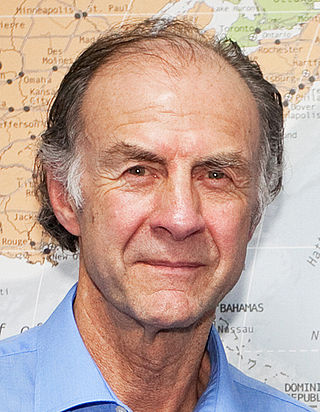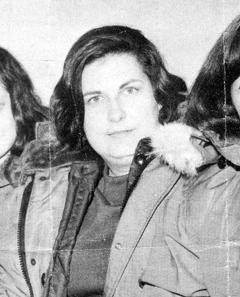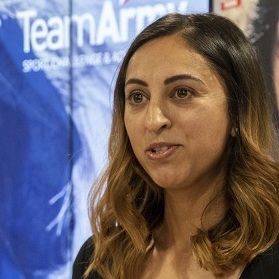Related Research Articles
Transport in Antarctica has transformed from explorers crossing the isolated remote area of Antarctica by foot to a more open era due to human technologies enabling more convenient and faster transport, predominantly by air and water, but also by land as well. Transportation technologies on a remote area like Antarctica need to be able to deal with extremely low temperatures and continuous winds to ensure the travelers' safety. Due to the fragility of the Antarctic environment, only a limited amount of transport movements can take place and sustainable transportation technologies have to be used to reduce the ecological footprint. The infrastructure of land, water and air transport needs to be safe and sustainable. Currently thousands of tourists and hundreds of scientists a year depend on the Antarctic transportation system.

Ann Bancroft is an American author, teacher, adventurer, and public speaker. She was the first woman to finish a number of expeditions to the Arctic and Antarctic. She was inducted into the National Women's Hall of Fame in 1995.

Sir Ranulph Twisleton-Wykeham-Fiennes, 3rd Baronet, commonly known as Sir Ranulph Fiennes and sometimes as Ran Fiennes, is a British explorer, writer and poet, who holds several endurance records.

Timothy John Jarvis is an English and Australian explorer, climber, author, environmental activist, and documentary filmmaker. He is best known for his numerous Antarctic expeditions, particularly his attempted Antarctic crossing in 1999 and the period recreations of historical treks by Sir Douglas Mawson and Sir Ernest Shackleton.

Scott's Hut is a building located on the north shore of Cape Evans on Ross Island in Antarctica. It was erected in 1911 by the British Antarctic Expedition of 1910–1913 led by Robert Falcon Scott.

Robert Charles Swan, OBE, FRGS is the first person to walk to both poles.

Antarctica is Earth's southernmost and least-populated continent. Situated almost entirely south of the Antarctic Circle and surrounded by the Southern Ocean, it contains the geographic South Pole. Antarctica is the fifth-largest continent, being about 40% larger than Europe, and has an area of 14,200,000 km2 (5,500,000 sq mi). Most of Antarctica is covered by the Antarctic ice sheet, with an average thickness of 1.9 km (1.2 mi).

The South Pole, also known as the Geographic South Pole or Terrestrial South Pole, is the southernmost point on Earth and lies antipodally on the opposite side of Earth from the North Pole, at a distance of 20,004 km in all directions. It is one of the two points where Earth's axis of rotation intersects its surface.

Willis Group Holdings plc was a multinational risk advisor, insurance brokerage and reinsurance brokerage company headquartered in the Willis Building in London. It was the third-largest insurance broker worldwide by revenues. In 2016, the company acquired Towers Watson and was renamed Willis Towers Watson.

Felicity Ann Dawn Aston is a British explorer, author and climate scientist.
Ellen Mosley-Thompson is a glaciologist and climatologist. She is a Distinguished University Professor at Ohio State University and director of their Byrd Polar and Climate Research Center. She is known as a pioneer in the use of ice cores from the Polar Regions for paleoclimatic research and is an influential figure in climate science. She is an elected fellow of the American Association for the Advancement of Science, the American Geophysical Union and an elected member of the National Academy of Sciences.
The Willis Resilience Expedition was a scientific and exploratory program in Antarctica from November 2013 to January 2014. The expedition's goal was to gain a better scientific understanding of the changes to Earth's climate due to global warming and weather-related phenomena. The expedition was announced in August 2013 and was led by explorers Douglas Stoup and Parker Liautaud. The expedition was underwritten by the Willis Group.
Eric Larsen is an American Polar adventurer known for his expeditions to the North Pole, South Pole, and Mount Everest.

Alain Hubert is a Belgian explorer. He is a certified mountain and polar guide, a civil engineer, and the founder President of the International Polar Foundation. With the Foundation and its private partners, he built and financed the construction of the scientific research station ‘Princess Elisabeth’. This station is the first ‘Zero Emissions’ station in Antarctica, designed under the spirit of the Madrid protocol system establishing in 1992 the strictest environmental rules to date for a continent through the Antarctic Treaty System.
Florica Topârceanu is an Antarctic researcher, best known for her work was on Antarctic aquatic viruses and the development of the Antarctic scientific community in Romania. She was the first Romanian woman biologist to study life in Antarctica and the first Romanian woman expert to the Antarctic Treaty.

Lois M. Jones was an American geochemist who led the first all-woman science team to Antarctica in 1969. They were also the first women to reach the South Pole. Jones was well regarded for her contribution to geological research in the McMurdo Dry Valleys, one of the few ice-free areas of Antarctica, and published many papers and abstracts.

There may have been women in Antarctica, exploring the regions around Antarctica for many centuries. The most celebrated "first" for women was in 1935 when Caroline Mikkelsen became the first woman to set foot on one of Antarctica's islands. Early male explorers, such as Richard Byrd, named areas of Antarctica after wives and female heads of state. As Antarctica moved from a place of exploration and conquest to a scientific frontier, women worked to be included in the sciences. The first countries to have female scientists working in Antarctica were the Soviet Union, South Africa and Argentina.

Harpreet Kaur "Preet" Chandi is a British physiotherapist and British Army medical officer who completed a solo expedition across Antarctica to the South Pole, finishing on 3 January 2022. In January 2023, she recorded the longest ever solo and unsupported polar expedition.
References
- ↑ "Teenager sets record for fastest trek from Antarctic coast to south pole". the Guardian. 25 December 2013.
- 1 2 Jeff Morganteen (2013-12-12). "Teenage Yale student attempts record trek to South Pole for research and climate change". Cnbc.com. Retrieved 2015-07-10.
- 1 2 "Parker Liautaud". Archived from the original on 2016-10-27. Retrieved 2015-07-02.
- ↑ "Parker Liautaud". Archived from the original on 2015-07-03. Retrieved 2015-07-02.
- ↑ ABC News. "19-Year-Old Parker Liautaud Expected to Set World Record in Antarctica". ABC News.
- ↑ "How can young people join in the debate about climate change?". The Elders. 17 October 2014.
- ↑ "Al Gore, Melinda Gates, Malala And More At The Social Good Summit". The Daily Beast. Archived from the original on 2016-03-04. Retrieved 2015-07-02.
- ↑ Parker Liautaud Discusses Climate Change in the Arctic - CGI 2014 Annual Meeting. YouTube. 16 October 2014.
- ↑ "Polar Explorer Parker Liautaud Talks Climate Change". wsj.com. 23 September 2014.
- ↑ "Parker Liautaud - UN Women – Beijing+20". Field Office Beijing Plus. 4 June 2014.
- ↑ "Parker Liautaud - TIME 30 Under 30: World Changers - TIME.com". TIME.com. 2013-12-06.
- ↑ "Engaging Americans in the Challenge of Climate Resilience". whitehouse.gov . 24 March 2014 – via National Archives.